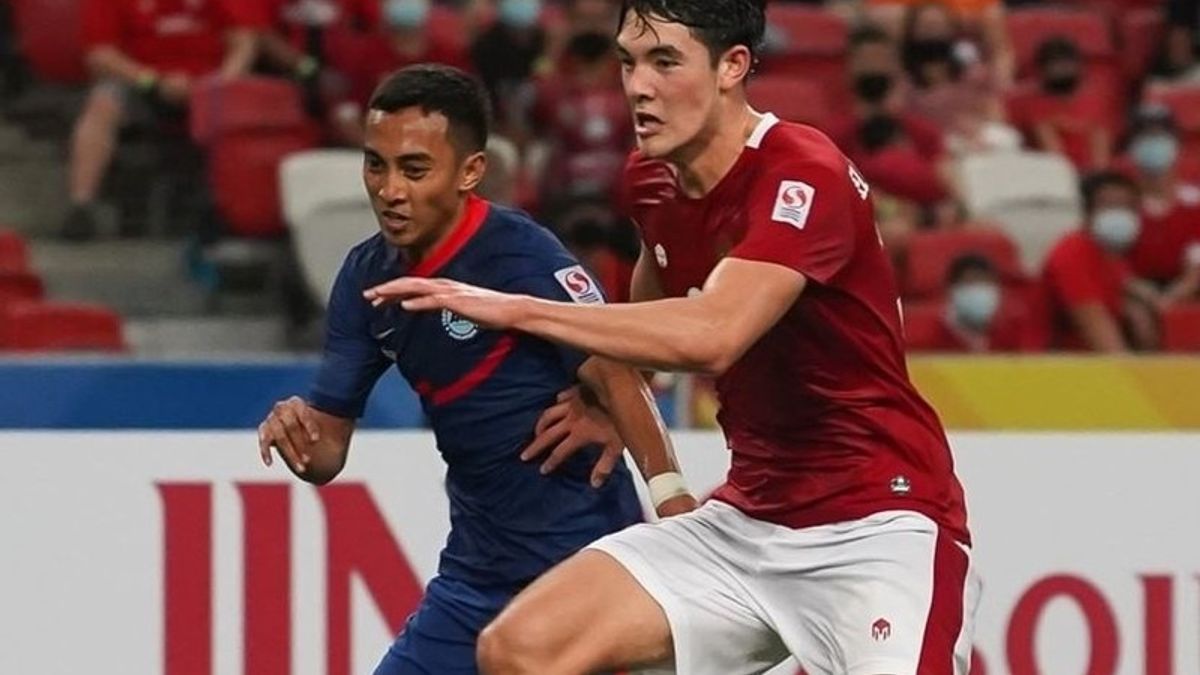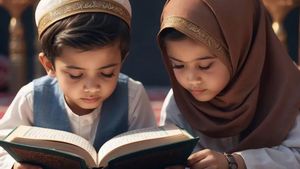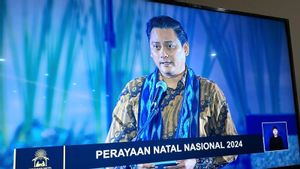JAKARTA - The issue of naturalization in the world of sports in Indonesia, especially football, has spread again. The recruitment of foreign nationals, both Indonesian and non-Indonesian, has again become the center of attention.
The names of Elkan Baggott, Sandy Walsh, Ragnar Oratmangoen, and many more are busy adorning social media pages and mainstream media. Their presence to strengthen the Indonesian national football team is predicted to lift the Red and White Team's achievements in international football competition.
As in the past, there have been differences of opinion. Those who claim to be progressive, consider it normal and believe that their move is right. Meanwhile, those who are considered conservative remain loyal to echo that revamping the competition from an early age to the professional league is much more important and effective, although it will take a long time.
Not NewNaturalization of players is not new in the world of football. Japan had started in the 1990s by naturalizing Rui Ramos. The Brazilian footballer was expected to play a role in qualifying Japan for the 1994 World Cup in the United States, but failed after the Blue Samurai Team failed to beat Iraq in the final qualifying round in Doha, Qatar, October 28, 1993.
Indonesia even started in 1952 when it naturalized Dutch goalkeeper Van der Vin. The naturalization of footballers became even more pronounced in 2010, when the names Irfan Bachdim (Netherlands), Cristian Gonzales (Uruguay), and Greg Nwokolo (Nigeria) joined the Indonesian national team after they became Indonesian citizens.

But their presence has not been able to bring the senior Indonesian national team to become champions, even at the Southeast Asian regional level. The last time the Indonesian senior football team won was at the 1991 SEA Games in Manila. At that time, Indonesia, which was trained by Anatoli Polosin from Russia with native domestic players, won 4-3 on penalties over Thailand.
Money CaseChina is also now joining in using the naturalization method of players, in order to advance the achievements of their national team in the international arena. President Xi Jinping, who is said to be a football enthusiast, is desperate for China to qualify for the Qatar 2022 World Cup, after 20 years of absence since the 2002 World Cup in Japan and South Korea.
No wonder the Chinese national football team currently has foreign names like Nico Yennaris and Tyias Browning from England, as well as Elkeson and Aloisio from Brazil. As Chinese citizens, they have changed their identity with names from the Han ethnicity.
One Brazilian name who was also naturalized by the Chinese national team during Lie Tie's coaching era is Fernando Henrique, who has changed his name to Fei Nanduo. It was reported that to recruit Fernando to change his nationality, a large amount of funds were prepared, reaching 60 million RMB or almost Rp 136 billion. But the player failed to enter the Chinese national team due to injury.

Hasani Abdulgani, a member of the PSSI Executive Committee which deals with the naturalization of Indonesian football players, said that the process of transferring nationality of players from abroad to the Indonesian national team did not involve money matters.
"From the experience that I'm running now, it turns out to be very different from the story of Chinese players. The four players that coach Shin Tae-yong asked, namely Sandy Walsh, Jordi Amat, Mees Hilgers and Ragnar Oratmangoen, did not ask for payment," said Hasani, who is also director of Mahaka Sports.
"The reason they usually want to defend the country of their ancestors, because they want to offer it to their parents," Hasani added.
Government SupportAlthough the issue of naturalization of soccer players continues to present a polemic, the Indonesian government through the Ministry of Youth and Sports (Kemenpora) continues to support it. The Ministry of Youth and Sports promised to help the naturalization process for the players, especially Walsh and Amat, who were almost certain because Shin Tae-yong really needed him for the national team.
“The government will help with the administrative process, but it is the federation that prepares the administration. Finding out whether they are of Indonesian blood is the task of the federation," said Menpora Zainudin Amali.
In addition to football, Indonesian basketball also naturalizes players. Nine foreign basketball players have been naturalized as Indonesian citizens since 2015. They are: Ebrahim Enguio Lopez (Philippines), Lamarr Johnson (USA), Anthony Ray Hargrove Jr (USA), Anthony Wayne Carter Jr (USA), Brandon van Dorn Jawato (USA). USA), Lester Prosper (Dominica), Marques Bolden (USA), Dame Diagne (Senegal) and Serigne Modou Kane (Senegal).

Just like naturalized players in football, naturalized basketball players have not contributed to winning titles for Indonesia in various international tournaments. Currently, two tournaments are being faced by the Indonesian men's basketball team, namely the FIBA Asia Cup 2021 and the FIBA World Cup 2023.
The Philippines is also an example of the use of naturalized players on a large scale, but to no avail. In the 2019 AFC Cup, the Philippines appeared in the finals in the United Arab Emirates with 19 naturalized players. That means 82 percent of all players brought in by the Philippines national team, which at that time was handled by world-class coach from Sweden, Sven-Goran Eriksson.
Joined in group C, the Philippines with their naturalized players only finished as caretaker. Of the three matches, all ended in the defeat of the Philippines. Respectively 0-1 from South Korea, 0-3 from China, and 1-3 from Kyrgyzstan.
Cultural IssuesAccording to Cameron Wilson, an observer of Chinese football and the founder of Wild East Football, spending a lot of money on the country's football will not do much to lift the achievements of the national team. The Scotsman who lives in Shanghai thinks that China does not have a deep-rooted football culture.
"They just don't feel like they have football, despite the great talent in China. It's like a giant gold mine, it's just a matter of time to find it," Wilson said as quoted by CNN.

According to Wilson, football culture is very important for advancing football in a country, he gave an example of England. Everything is built from scratch, love is grown, nurtured continuously. It's not a shortcut, it's not just a waste of money, although that's also important.
Wrapping the naturalization of athletes in the packaging of nationalism does seem noble, patriotic. But does it really work in achievement, and their nationalism will last forever? We are all waiting for the final result.
The English, Chinese, Japanese, Arabic, and French versions are automatically generated by the AI. So there may still be inaccuracies in translating, please always see Indonesian as our main language. (system supported by DigitalSiber.id)









